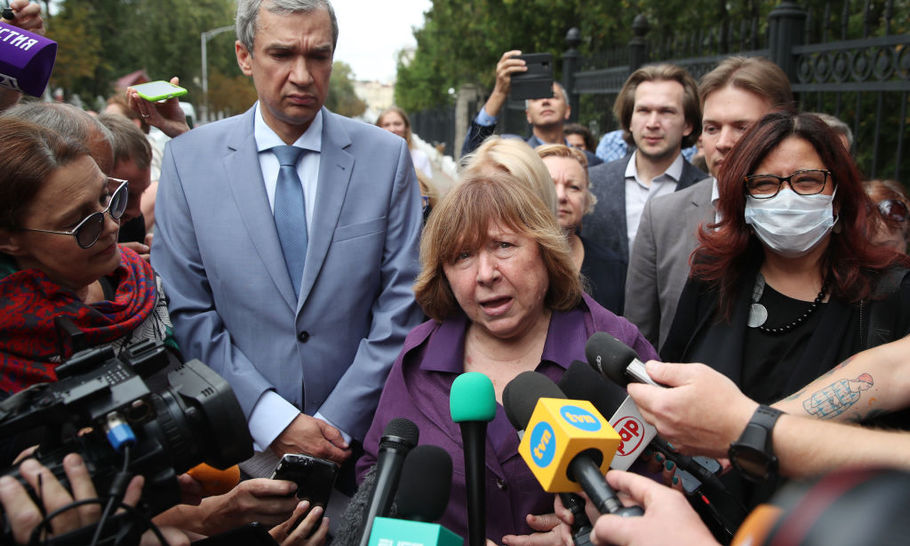In the Belarussian Revolution, women are leading the charge

(Photo by Natalia FedosenkoTASS via Getty Images)
While the rest of Europe waits anxiously for a new wave of Covid-19, Belarus is having a moment. More than a moment, in fact: for the first time in its history, but long after the neighbouring post-Soviet republics, this landlocked, downtrodden Stalinist time-capsule has finally found its voice.
What is happening in Minsk is not a revolt, but a revolution — and one that, uniquely in such a patriarchal culture, has so far been led and, increasingly, borne by women. With incredible courage, they are unmasking the KGB thugs who arrest and torture their husbands and sons. Most of their leaders are either under arrest or have sought refuge abroad. Svetlana Tikhanovskaya, who was cheated in last month’s rigged election, is in Lithuania. Her colleague, Veronica Tsepkalo, is reported to be in Ukraine. Bravest of all is Maria Kolesnikova, who thwarted the goons who tried to drive out of her country by tearing up her passport and climbing out of their van. She is in prison, and her release is one of the main demands of the protestors who on Sunday defied the military to surround the presidential residence.
After a fifth consecutive weekend of mass protests, Alexander Lukashenko — the moustachioed mini-Hitler who has brutalised the country for a quarter of a century — is quaking in his jackboots. His rodent-like appearance and feral viciousness have given him the nickname “the rat”. Now the rat has ratted.
Lukashenko’s visit to the Kremlin today is his last throw of the dice. If Vladimir Putin does not come to the rescue of his tottering regime, the best that he can hope for is to die in exile. The Russian President despises Lukashenko almost as much as his compatriots and would dearly like to serve him a Novichok tea, but he knows that he cannot afford to let people power overthrow a dictator in whom he has invested so much capital.
So far, Putin has sent propagandists to bolster the state media in Minsk and this week there will be joint military exercises. But there is no sign yet of the anonymous mercenaries and special forces who destabilised eastern Ukraine. The political cost of such covert operations, let alone a full-scale invasion, is too great for the Kremlin even to contemplate.
In any case, Putin has his own domestic opposition to worry about: support for his United Russia party has slumped in polls to about 30 per cent. In a symbolic victory, a supporter of Alexei Navalny has gained a seat on the council in the Siberian city of Tomsk, where the icon of Russian resistance was poisoned in the airport. He has now emerged from a coma in Berlin, where he is recovering. Though he cannot return to Russia, at least for the foreseeable future, he remains a potential threat to Putin even from his hospital bed at the Charit é . No wonder security there has been stepped up.
The drama of Belarus is the stuff of poetry. The oldest of the formidable women who have shaken Lukashenko’s grip on power is the writer Svetlana Alexievich (pictured above), the last of the seven members of the opposition executive to remain at large in Belarus. The septuagenarian Nobel laureate has turned her distinctive brand of literary reportage, chronicling the lives of ordinary Belarusians, into an art form. Her prestige has thus far helped to save her from arrest, but the desperadoes of Lukashenko’s KGB will stop at nothing.
Now that they have lost their fear of the secret police, the “March of Heroes”, the youthful protesters who streamed across the Belarussian capital in defiance of water cannon and even live ammunition, seem irresistible. Conscious that they are playing a historic role, they might well echo Wordsworth: “Bliss was it in that dawn to be alive, but to be young was very heaven!”
As Simon Schama reminded us in his new television series on the Romantics, it was her first-hand experience of revolution that prompted Mary Wollstonecraft to write the first great feminist tract: A Vindication of the Rights of Woman. Unlike the women of Paris in 1789, however, the women of Minsk in 2020 are unlikely to let their menfolk force them back into a submissive role once the revolution has triumphed. What we are witnessing in Belarus is not just a display of people power. It is the first time in history that women have led the charge against despotism. Belarusian feminism is not Me Too — it is very much Us Too.





